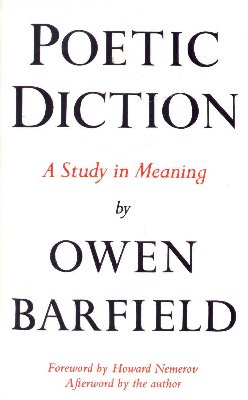
| Felt Change of Consciousness |
Barfield discovered
the felt change of consciousness early on in his first encounters with
poetry:
The way in which almost any intense experience of poetry reacted on my experience of the outer world [made a tremendous impression]. The face of nature, the objects of art, the events of history and human intercourse betrayed significances hitherto unknown as the result of precisely these poetic or imaginative combinations of words. . . . I found I knew (there was no other word for it) things about them which I had not known before. . . . those enhanced meanings may reveal hitherto unapprehended parts or aspects of reality. (RCA 10)His B. Lit. thesis at Oxford, later published as Poetic Diction (1928), was inspired by these experiences. The idea of the felt change of consciousness lies at the heart of the thesis he expounds upon there.
To help explain this
difficult-to-understand, quite ephemeral concept, Barfield uses an analogy
drawn from electromagnetism:
It is not simply that the poet enables me to see with his eyes, and so to apprehend a larger and fuller world. He may indeed do this . . . , but the actual moment of the pleasure of appreciation depends on something rarer and more transitory. It depends on the change itself. If I pass a coil of wire between the poles of a magnet, I generate in it an electric current--but I only do so while the coil is positively moving across the lines of force.
- . . . Current only
flows when I am actually bringing the coil in or taking it away again.
So it is with the poetic mood, which, like the dreams to which it has so
often been compared, is kindled by the passage from one plane of consciousness
to another. It lives during the moment of transition and then dies, and
if it is to be repeated, some means must be found of renewing the transition
itself. (PD 52)
As gestalt
psychology has taught us to see, we cannot experience both figure and
ground at one and the same time. Nor can we live the wisdom which poetry
give us--poetry's task being to add "extraordinary consciousness to our
ordinary consciousness" (RM 30)--and experience its entrance into
us simultaneously.
Inasmuch as man is living the poetry of which he is the maker, and as long as he is so doing, it cannot be poetry to him. In order to appreciate it, he himself must also exist, consciously, outside it; for otherwise the "felt change of consciousness" cannot come about. (PD 103)Felt change of consciousness, then, marks the actual ontogenetic experience of evolution of consciousness, as Barfield explains in Poetic Diction's peroration, its closing words:
Over the perpetual evolution of human consciousness, which is stamping itself upon the transformation of language, the spirit of poetry hovers, for ever unable to alight. It is only when we are lifted above that transformation, so that we behold it as present movement, that our startled souls feel the little pat and the throbbing, feathery warmth, which tell us that she has perched. It is only when we have risen from beholding the creature into beholding creation that our mortality catches for a moment the music of the turning spheres. (PD 181)
| See in particular Poetic Diction, passim; "Poetic Diction and Legal Fiction" (RM 44-64). |